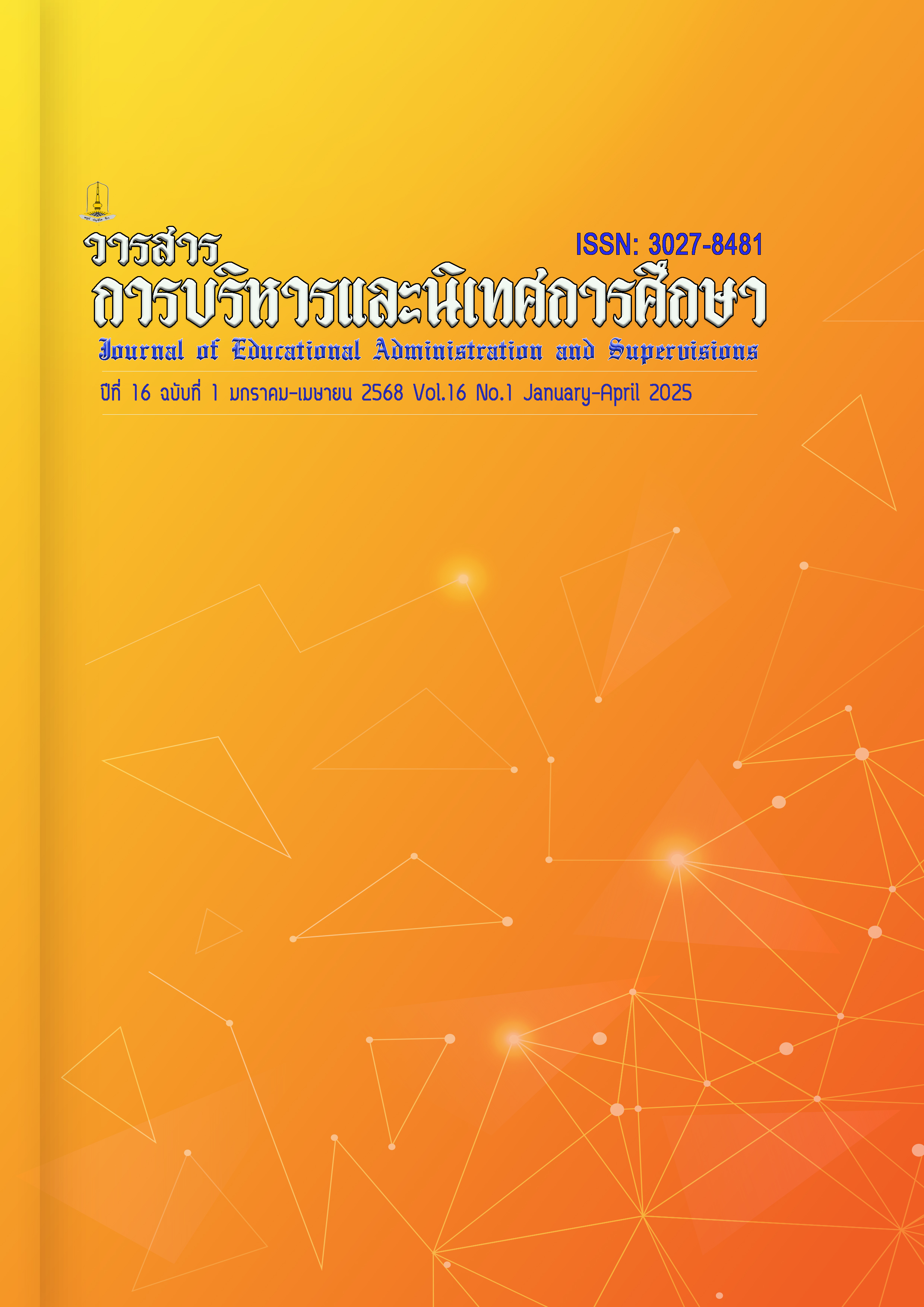School Administrators in Disruptive World under Secondary Educational Service Area Office Songkhla Satun
Main Article Content
Abstract
The objectives of this research are: 1) study adaptive leadership of school administrators in the disruptive world; 2) compare opinions of teachers towards adaptive leadership of school administrators in the disruptive world based on the variables of gender, age, educational background, work experience, and school size; and 3) conclude suggestions on the adaptive leadership of school administrators in the disruptive world. The sample group consisted of 338 government teachers, determined using Krejcie and Morgan's formula and selected by stratified random sampling by school size, followed by simple random sampling by drawing lot. The research instrument was a 42-item, 5-point Likert scale questionnaire with the IOC value is 0.6 upper, an overall reliability of .972. The statistics used for data analysis were frequency, percentage, mean, standard deviation, t-test, F-test, Least Significant Differences (LSD), and content analysis.
The research findings revealed that: 1) the adaptive leadership of school administrators in the disruptive world, both holistic and individual aspects, were at a good level, 2) the comparison results showed that the opinions of teachers with different genders, ages, educational backgrounds, and work experiences were different, both holistic and individual aspects, were not different. However, the opinions of teachers working at schools with different sizes were different, both holistic and individual aspects, at the significance level of .001, and 3) it was suggested that the school administrators should put an emphasis on continuous organizational development, personnel development, and self-development focusing on learning new things and application of technology for development; moreover, the school administrators should have good personality, be good model, have emotional intelligence, be able to control emotions in all situations, and make fair and transparent decisions to build trust and morale among staff in the organization.
Downloads
Article Details

This work is licensed under a Creative Commons Attribution-NonCommercial-NoDerivatives 4.0 International License.
References
จิตติ หงษ์เวียงจันทร์ และมิตภาณี พุ่มกล่อม. (2567). ภาวะผู้นำแบบเห็นอกเห็นใจของผู้บริหารสถานศึกษาตามความคิดเห็นของครู สังกัดสำนักงานเขตพื้นที่การศึกษาประถมศึกษากาญจนบุรี เขต 2. วารสารมจร กาญจนปริทรรศน์, 4(2), 90–103. https://so05.tci-thaijo.org/index.php/Kanchanaeditor/article/view/274281
จิระพงษ์ ชมกลิ่น, นันทนิตย์ ท่าโพธิ์, สุรีรัตน์ บุญจันทร์, และสถิรพร เชาวน์ชัย. (2567). แนวทางการพัฒนาคุณลักษณะภาวะผู้นำการเรียนรู้ของผู้บริหารสถานศึกษา สำนักงานเขตพื้นที่การศึกษาประถมศึกษาพิษณุโลก เขต 3. Journal of Roi Kaensarn Academi, 9(8), 399–411. https://so02.tcithaijo.org/index.php/JRKSA/article/view/269327
ณฐภัทร อินทรปรีดา, ประสาร มาลากุล ณ อยุธยา, และผ่องพรรณ เกิดพิทักษ์. (2565). ภาวะผู้นำการปรับเปลี่ยนเพื่อเสริมสร้างการบริหารจัดการงานในโลกแห่งความผันผวน. วารสารราชพฤกษ์, 20(2),16–28. https://so05.tci-thaijo.org/index.php/Ratchaphruekjournal/article/view/256517
ณฐาพัชร์ วรพงศ์พัชร์, พงษ์ศักดิ์ ผกามาศ, สุริยะ วชิรวงศ์ไพศาล, และจิรนันท์ ใหญ่ลำยอง. (2565). แนวทางการพัฒนาภาวะผู้นำแบบปรับตัวของผู้บริหารสถาบันการอาชีวศึกษามืออาชีพภายใต้สถานการณ์วิถีปกติใหม่และวิถีถัดไปในภาคตะวันออกของประเทศไทย. วารสารพุทธมัคค์, 7(1), 204–218. https://so01.tci-thaijo.org/index.php/bdm/article/view/248391
ณัฏฐ์มนกาญน์ กลิ่นน้อย, และทัศพร เกตุถนอม. (2566). ความฉลาดทางอารมณ์ของผู้บริหารสถานศึกษากลุ่มพัฒนาการศึกษาที่ 8 สำนักงานเขตพื้นที่การศึกษาประถมศึกษาราชบุรี เขต 1. วารสารมหาจุฬานาครทรรศน์, 10(10), 211–221. https://so03.tci-thaijo.org/index.php/JMND/article/view/272920
ธีรวุฒิ เอกะกุล. (2543). ระเบียบวิธีวิจัยทางพฤติกรรมและสังคมศาสตร์ (พิมพ์ครั้งที่ 2). อุบลราชธานี สถาบันราชภัฏอุบลราชธานี.
พระอธิการกิตติศักดิ์ สุธีโร, และสยาม ราชวัตร. (2562). โยนิโสมนสิการ: หลักการคิดที่เหมาะสมกับคนไทยในยุค 4.0. วารสารพุทธศิลปกรรม, 2(1), 87–101. https://so09.tci.thaijo.org/index.php/barts/article/view/1648
พัฒนศักดิ์ อภัยสม, ณัฐรดา คณารักษ์, ดนุดา ณ กาฬสินธุ์, อดินันท์ แก้วนิล, ชวนคิด มะเสนะ, และนิรมิต ชาวระนอง. (2565). แบบภาวะผู้นำทางการศึกษายุคใหม่. วารสารวิชาการมหาวิทยาลัยราชภัฏศรีสะเกษ, 16(2), 1–12. https://so05.tci-thaijo.org/index.php/sskrujournal/article/view/255133
ศศิวิมล มาลาพงษ์. (2567). ภาวะผู้นำของผู้บริหารสถานศึกษาที่มีต่อการปฏิบัติงานของครู สังกัดสำนักงานเขตพื้นที่การศึกษามัธยมศึกษา กรุงเทพมหานคร เขต 1. วารสารวิจัยวิชาการ, 7(3), 75–86. https://doi.org/10.14456/jra.2024.61
สำนักงานเขตพื้นที่การศึกษามัธยมศึกษาสงขลา สตูล. (2566). แผนพัฒนาการศึกษาขั้นพื้นฐาน พ.ศ.2566—2570.
สำนักงานเลขานุการของคณะกรรมการยุทธศาสตร์ชาติ. (2561). ยุทธศาสตร์ชาติ พ.ศ.2561-2580. สำนักงานเลขานุการ ของคณะกรรมการยุทธศาสตร์ชาติ และสำนักงานคณะกรรมการพัฒนาการเศรษฐกิจและสังคมแห่งชาติ. https://www.nesdc.go.th/download/document/SAC/NS_SumPlanOct
สำนักงานสภาพัฒนาการเศรษฐกิจและสังคมแห่งชาติ. (2565). แผนพัฒนาเศรษฐกิจและสังคมแห่งชาติ ฉบับที่ สิบสาม พ.ศ. 2566 -2570 สำนักงานสภาพัฒนาการเศรษฐกิจและสังคมแห่งชาติ. https://www.nesdc.go.th/ article_attach/article_file_20230307173518.pdf.
สุวัฒน์ จุลสุวรรณ์. (2563). ความสัมพันธ์ระหว่างภาวะผู้นำการปรับเปลี่ยนกับประสิทธิผลการบริหารสถานศึกษา สังกัดสำนักงานคณะกรรมการการศึกษาขั้นพื้นฐาน. วารสารวิชาการมหาวิทยาลัยการจัดการและเทคโนโลยีอีสเทิร์น, 17(2), 28–40. https://so06.tci-thaijo.org/index.php/umtpoly/article/view/246302
Bagwell, J. (2020). Leading through a pandemic: Adaptive leadership and purposeful action. Journal of School Administration Research and Development, 5(S1), 30–34. https://www.ojed.org/index.php/JSARD/article/view/2781
Cuofano, G. (2024). What is adaptive leadership? Adaptive leadership in a nutshell. FourWeekMBA. https://fourweekmba.com/adaptive-leadership/
Heifetz, R. (2020). The practice of adaptive leadership: Tools and tactics for changing your organization and the world. Harvard Kennedy School. 79 John F. Kennedy Street Cambridge, MA.
Hoerudin, C. W. (2020). Adaptive leadership in digital era: Case study of RIDWAN KAMIL. CosmoGov, 6(1), 89–98. http://jurnal.unpad.ac.id/cosmogov/ article/view/26793
Krejcie, R.V. and Morgan, D.W. (1970) Determining Sample Size for Research Activities. Educational and Psychological Measurement, 30, 607-610. https://journals.sagepub.com/doi/10.1177/001316447003000308
Miller, A.E. (2019). Leadership theory analysis: Adaptive leadership teaching course. Azusa Pacific University


